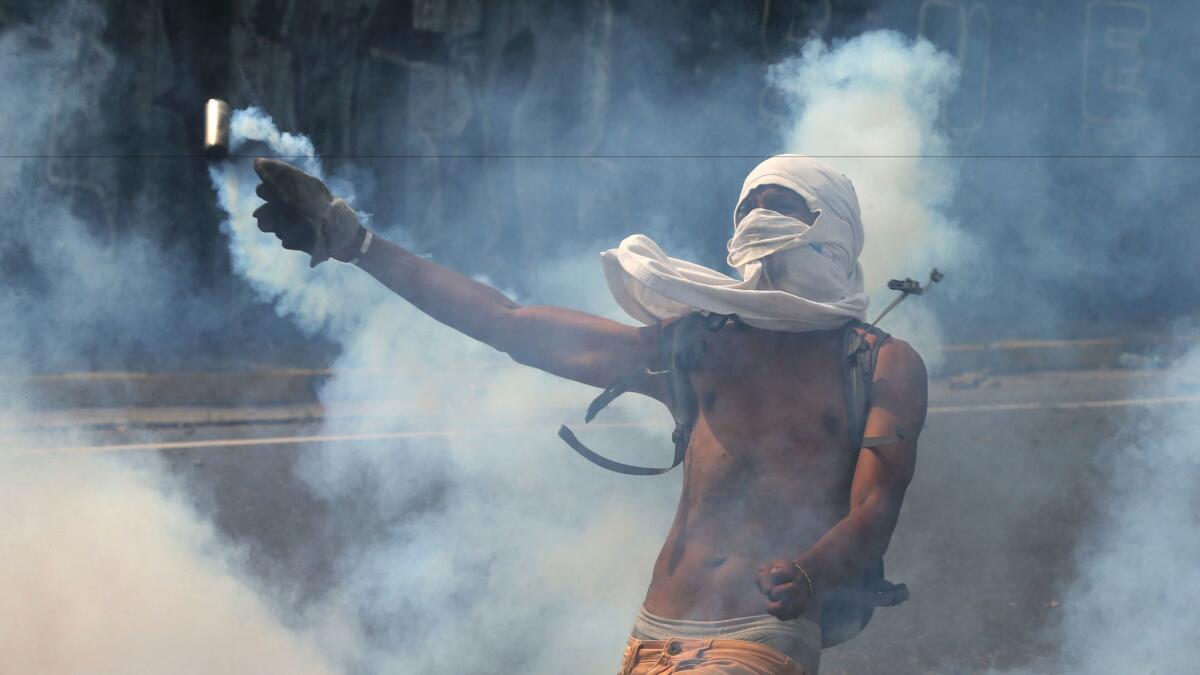As president calls for new constitution, Venezuela veers once again toward political chaos

Reporting from Caracas, Venezuela — Already reeling from massive antigovernment marches in recent weeks, Venezuela is bracing for more demonstrations Wednesday as increasingly vocal activists protest the surprise plan by President Nicolas Maduro to draft a new constitution. Opposition leaders condemned the proposal as an antidemocratic move that will only aggravate the country’s ongoing political crisis.
In an announcement at a May Day rally Monday, Maduro said he would seek to replace the constitution pushed through in 2000 by his late predecessor, Hugo Chavez. The new document would be drafted at an assembly consisting of 500 delegates, 250 of whom will be selected from “communal” groups recognized by Maduro’s government, which will likely assure his control over the final version, opponents said.
For the record:
12:00 a.m. June 23, 2019An earlier version of this story said the protests were ignited by the April 4 decision by the Supreme Court to strip the National Assembly of its legislative powers. That decision was made March 29.
Maduro critics expressed their outrage at the plan at a time when his government has curtailed the powers of the opposition-controlled National Assembly and indefinitely postponed elections of governors and mayors.
Henrique Capriles, an opposition leader and governor of Miranda state, said at a news conference Tuesday that the Maduro plan was a “constitutional fraud” and a “mechanism to do away once and for all with the National Assembly.” He called on supporters to go to the streets Wednesday to voice their opposition to the plan.
Late Monday, opposition Assemblyman Julio Borges, who heads an alliance of opposition parties, said the aim of the new constitutional assembly would be to “dissolve democracy and the republic…. It’s a swindle designed to fool the people.”
The United States and countries throughout Latin America have denounced the Maduro government in recent weeks. In response Venezuela has threatened to withdraw from the Organization of American States.
On Tuesday, Michael Fitzpatrick, the State Department deputy assistant secretary for the Western Hemisphere, told reporters in Washington that the U.S. will talk to other countries in the region to consider imposing new sanctions on Venezuela in light of Maduro’s recent crackdown on dissent.
Maduro’s approval rating has plummeted to 21%, according to a recent poll by Datincorp, a political consulting agency, as even past supporters grow weary of food shortages, violent crime and a collapsed economy.
Also on Monday, Maduro announced the third increase this year in the minimum wage, raising it by 60%. But even so, wages are not keeping pace with galloping inflation, which according to the International Monetary Fund could reach 720% this year.
“The current constitution is a nothing but an obstacle for the new radical phase of the ‘revolution,’” said Datincorp analyst Jesus Seguias in a text to the Los Angeles Times on Tuesday. “From here on out, the socialist plan of [the Maduro government] is possible only in a dictatorship.”
In a televised speech Monday night, Maduro said half of the constitutional assembly’s delegates would come from groups representing “the working-class base, the communes, the social movements, handicapped groups, retirees, indigenous, students and youth.”
The remaining 250 delegates would be elected by Venezuelan voters at large. Capriles, who urged Maduro opponents to boycott such an election, said voting for “all delegates to such an assembly has to be direct, universal and secret.”
Since early April, cities across Venezuela have been engulfed in protests and sometimes violent clashes with police and National Guard that have left 29 dead, 437 injured and 1,289 arrests. The protests were ignited by the March 29 decision by the Maduro-aligned Supreme Court to strip the opposition-controlled National Assembly of its legislative powers.
Although the court, at Maduro’s urging, quickly retracted the decision, protests were soon reignited when the controller general’s office ruled Capriles was ineligible to stand for election until 2032 because of alleged misuse of public funds as governor.
Capriles, who denied the charges, was seen as Maduro’s strongest potential opponent in presidential elections due to be held next year. Capriles also challenged the controller’s authority to disqualify a sitting governor, saying only the Supreme Court had that power.
Luis Salamanca, political science professor at Central University of Venezuela in Caracas , said Maduro’s plan is a political calculation, not a constitutional one.
“Maduro is looking for a way to avoid elections that should be held soon: governors and mayors this year and presidential elections in 2018, and to preserve his power without them,” Salamanca said.
Salamanca added that another reason for the new constitution would likely be “to take the National Assembly out of play and create a communal parliament so that Maduro could assume absolute powers, like a monarch, liquidating the republic.”
Special correspondents Mogollon and Kraul reported from Caracas, Venezuela, and Bogota, Colombia, respectively.
ALSO
Mexico captures Sinaloa cartel leader Damaso Lopez, a former associate of ‘El Chapo’ Guzman
What it’s like to report in one of the world’s deadliest places for journalists
After GM flees their country, Venezuelans take sides over who is to blame
More to Read
Sign up for Essential California
The most important California stories and recommendations in your inbox every morning.
You may occasionally receive promotional content from the Los Angeles Times.










